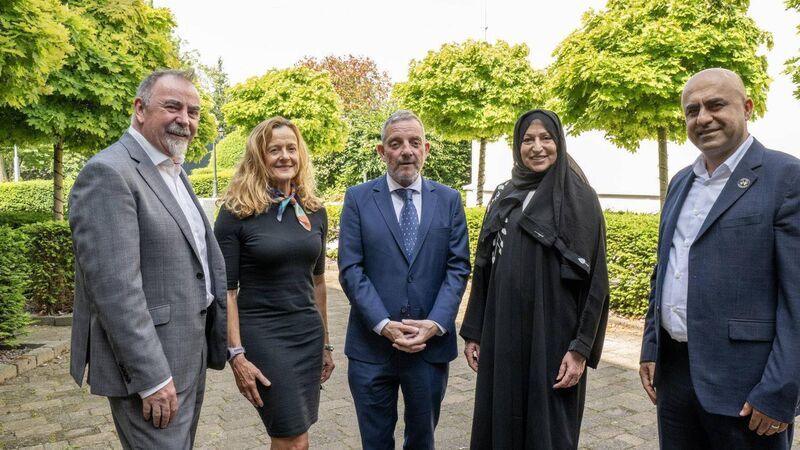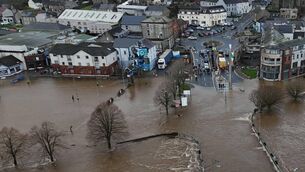Cork Views: Community is key to supporting people seeking protection

Pictured at the SECAD Skills Celebration event, held in Cork, to mark World Refugee Day 2025 were SECAD CEO Ryan Howard, Social Inclusion Programmes Manager Toni McCaul, Minister of State Jerry Buttimer TD, with event guest speakers Sorina Gabor and Izz Alkarajeh. Hosted by SECAD Partnership, the celebration honoured over 100 people seeking protection in Ireland who completed job skills training in sectors like healthcare, construction, and hospitality, supported through SECAD’s SICAP and New Arrivals Programmes. PIC: Brian Lougheed
In Cork and across Ireland, people are arriving every day in search of protection, peace, and the possibility of a better life. These individuals and families come from diverse backgrounds and cultures, each carrying with them stories of resilience, strength, and hope.
At SECAD, we meet people where they are – often at a crossroads – and walk alongside them as they take the first steps toward rebuilding their lives in a new country.
The foundation for that new beginning is education, not just in the formal classroom sense, but in the broader, more transformative sense of providing people with the tools they need to navigate a new society, build skills, access employment, and connect with their communities. We believe that education is one of the most powerful tools for empowerment and integration, and it has never been more important.
This World Refugee Day, we had the honour of celebrating over 100 Cork-based people seeking protection in Ireland who completed skills training programmes through SECAD. The event was about far more than certificates and qualifications – it was a celebration of resilience, potential, and community. The participants trained in essential areas like healthcare, construction, food safety, and security – sectors crying out for skilled workers, and in which many of our learners are now ready to thrive.
Since 2022, SECAD has supported nearly 1,200 people seeking protection through a comprehensive network of programmes delivered under SICAP (Social Inclusion and Community Activation Programme), Tús, and the Asylum, Migration and Integration programme Fund. These aren’t just services – they’re stepping stones on a pathway to self-sufficiency, belonging, and purpose.
Our work begins with listening. Too often, people seeking protection are spoken about rather than with. We start by listening to their stories, their goals, and their needs. From there, we offer a suite of tailored supports: orientation workshops, English language programmes, employment services, wellbeing initiatives, and community connection activities.
A standout among these is our English Conversation Clubs – now active in Youghal, Cobh, Macroom, and Millstreet, learning from the original Fáilte Isteach model, Midleton. These volunteer-led clubs go far beyond grammar and vocabulary. They are spaces where learners build confidence, feel welcomed, and begin to actively participate in their new communities. In the past year alone, 148 learners across the county have been supported through these clubs, and we’ve seen not just linguistic improvement but deeper engagement in civic and social life.
Equally important is the impact on the 87 volunteers who facilitate these sessions. Many tell us that the experience has enriched their own lives – boosting their wellbeing, broadening their perspectives, and deepening their commitment to inclusion. This mutual benefit is what community is all about – giving, receiving, and growing together.
Our employment support teams, based in six community hubs across South Cork – Midleton, Youghal, Cobh, Carrigaline, Macroom and Millstreet – play another key role. They work with participants on CVs, interview skills, and job searches, but they also offer something equally valuable: belief. Belief that individuals who have faced enormous upheaval and trauma can – with the right support – find meaningful work, contribute to society, and achieve economic independence.
Skills training has become one of the most effective tools in this journey. From SafePass certification for construction work to QQI-accredited healthcare training, HACCP food safety courses, and IT skills development, we equip people with the qualifications needed to enter the Irish workforce. These are real, practical steps that build confidence, open doors, and make futures possible.
Some of our recent training programmes were delivered in partnership with organisations such as Progressive College and supported by funding streams like REACH, which allowed for the establishment of a laptop loan scheme. This made a huge difference to learners who otherwise might not have been able to access online training. This kind of collaboration – between SECAD, government departments, educational institutions, and local employers – is crucial. Together, we create a supportive ecosystem that fosters integration from every angle.
But education doesn’t stop at the classroom or the workplace. Since 2018, SECAD has championed intercultural understanding through initiatives like our “Celebrating Multiculturalism Through Food” events as part of the FEAST Midleton Food Festival and the Macroom Food Festival. These events bring people from over 20 nationalities together to share dishes, stories, and traditions. Food, after all, is one of the most universal languages we have – and sharing it breaks down barriers, fosters empathy, and creates space for connection.
Everything we do at SECAD is rooted in one central idea: community is our superpower. Whether it’s a conversation club, a CV workshop, or a shared meal, we are building something much greater than any single programme or service – we are building trust, solidarity, and a shared future.
On World Refugee Day, we celebrated more than just individual achievement – we celebrated the collective strength of the community. We saw employers engaging with jobseekers, volunteers connecting with learners, and neighbours becoming friends.
This is what real integration looks like. And this is the Ireland we believe in – a place where everyone, no matter where they come from, has the opportunity to belong, contribute, and thrive. We are all members of this community, working in it and for it. And we are all better for it.







 App?
App?




